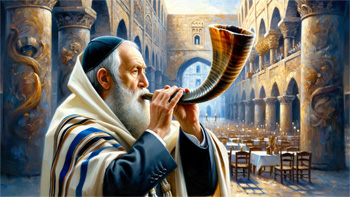 Rosh Hashanah in Israel
Rosh Hashanah in Israel


Rosh Hashanah, the Jewish New Year, is a deeply significant and widely celebrated festival in Israel. Marking the beginning of the Jewish High Holy Days, this two-day festival is rich in traditions and customs. It falls on the first two days of Tishrei, the seventh month of the Hebrew calendar, which usually corresponds to September or early October in the Gregorian calendar. Rosh Hashanah is not just a New Year celebration; it's a time of introspection, prayer, and renewal for Jewish people.
One of the core themes of Rosh Hashanah is the concept of reflection and repentance. It's believed that during this time, God assesses each person's deeds over the past year. The holiday provides an opportunity for individuals to reflect on their actions, seek forgiveness, and make resolutions for the upcoming year. This period of soul-searching is intended to encourage personal growth and moral improvement.
Rituals and Customs of Rosh Hashanah
The celebration of Rosh Hashanah is marked by various rituals and customs that are both solemn and joyous. One of the most iconic symbols of Rosh Hashanah is the shofar, a ram's horn trumpet. Blowing the shofar is a central part of the holiday's synagogue services. Its piercing sound is meant to awaken the soul and call individuals to repentance. The shofar is traditionally blown each morning of the festival, except when the first day of Rosh Hashanah falls on the Sabbath.
Another significant practice during Rosh Hashanah is Tashlich. This ritual involves going to a flowing body of water, like a river or an ocean, and symbolically casting off sins by throwing pieces of bread into the water. The act of Tashlich is a physical representation of the desire to rid oneself of past mistakes and start anew.
Traditional Foods and Their Symbolism
Rosh Hashanah is also a time for special foods and meals. Eating sweet foods is a key tradition, symbolizing the hope for a sweet new year. Apples dipped in honey are a classic example. The sweetness of the honey and the freshness of the apple represent the desire for a good and fruitful year ahead. A round challah, a type of braided bread, is often served to symbolize the cycle of the year. Sometimes raisins are added to the challah for extra sweetness.
Pomegranates are another food commonly associated with Rosh Hashanah. They are eaten with the wish that one's merits in the coming year will be as numerous as the seeds of the fruit. Fish is also traditionally served, symbolizing the desire to be fruitful and multiply like fish in the sea. These foods are not just culinary traditions but carry deep symbolic meanings tied to the themes of renewal and hope.
Synagogue Services and Prayers
Attending synagogue services is an essential part of Rosh Hashanah. These services are longer and more elaborate than regular services and include special prayers and readings. The liturgy of Rosh Hashanah includes the "Machzor," a special prayer book used for both Rosh Hashanah and Yom Kippur. Central to these prayers is the concept of God's sovereignty and remembrance. The prayers focus on the themes of God's kingship, the remembrance of past deeds, and the hope for a peaceful and prosperous future.
One of the unique aspects of the Rosh Hashanah service is the blowing of the shofar, which occurs at specific points during the prayer service. The sound of the shofar, with its various notes and sequences, is a central and moving part of the service, resonating deeply with congregants.
Rosh Hashanah in Israeli Society
In Israel, Rosh Hashanah is a public holiday, and the country adopts a festive atmosphere. Businesses and schools are closed, allowing families and friends to gather and celebrate together. It's a time for family reunions, special meals, and communal prayers. The holiday also reflects the diverse cultural fabric of Israeli society. Jews from different backgrounds – Ashkenazi, Sephardi, Ethiopian, and others – bring their unique customs and foods to the celebration, creating a rich tapestry of traditions.
Moreover, Rosh Hashanah in Israel is not just limited to religious aspects. Many secular Israelis also observe the holiday, using it as a time for family gatherings and personal reflection. This blend of religious and secular observance is a testament to the deep cultural roots and broad appeal of the festival in Israeli life.
Family and Community in Rosh Hashanah Celebrations
Family is at the heart of Rosh Hashanah celebrations. In many homes, extended family members gather for festive meals and to share blessings. It's a time for reconnecting with relatives, often over long distances, and strengthening family bonds. The holiday's emphasis on reflection and renewal extends to relationships, with many taking the opportunity to mend fences and deepen connections with loved ones.
Community plays a vital role in Rosh Hashanah as well. Synagogues become bustling centers of activity, bringing together individuals from diverse backgrounds. In addition to religious observances, community organizations often host events and activities, such as charity drives and educational programs, to engage members in the spirit of the holiday. These communal gatherings reinforce a sense of belonging and shared heritage among participants.
The Significance of Rosh Hashanah
Rosh Hashanah is more than just a new year celebration; it is a time of communal and personal transformation. The rich tapestry of rituals, customs, foods, and prayers all contribute to the holiday's profound significance. Whether through the soul-stirring blasts of the shofar, the sweetness of honey-dipped apples, or the warmth of family gatherings, Rosh Hashanah offers a powerful opportunity for introspection, renewal, and connection. As the gateway to the High Holy Days, it sets the tone for a period of deep spiritual reflection and aspiration for a better, more meaningful life in the year to come.